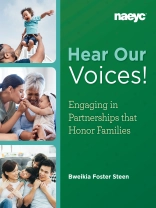Listening to All Families Matters
Families are their children’s first teachers. Early childhood educators know this, but what does it mean in practice? Participation, involvement, and engagement are only the first steps toward the true goal: reciprocal family partnerships. Discover how to move beyond inviting families to program events or connecting them to resources and instead recognize them as experts who meaningfully contribute to children’s learning and development.
Based on over two decades of research by the author, this resource:
- Establishes why reciprocal family partnerships are essential within the contexts of child development theories, developmentally appropriate practice, and anti-bias education
- Analyzes the important role that using a strengths-based approach plays in successfully building long-lasting relationships and partnerships
- Provides practical strategies and activities to help teachers and administrators examine and improve their practices for partnering with families
- Uplifts the authentic feelings and words of a diverse breadth of families
Families have voices that are waiting to be heard—time to listen.
Содержание
About the Author
Acknowledgments
Introduction
Chapter 1: Why Family Voices and Their Stories Matter
Chapter 2: Building Reciprocal Family Partnerships
Chapter 3: Creating a Caring Community and Welcoming Environment
Chapter 4: Meeting the Needs of Families Through Assessment
Chapter 5: Strategies and Activities for Honoring and Partnering with Families
Appendix: Family Partnership Organizations for Educators and Families
References
Index
Об авторе
Bweikia Foster Steen, Ed D, is associate professor and internship coordinator in the early childhood education program in the College of Education and Human Development at George Mason University. She received her doctoral degree from the University of San Francisco in international and multicultural education. Dr. Steen has over 25 years of experience in early childhood education. Previously, she taught children from birth through age 8 in the San Francisco Bay Area and on the collegiate level at California State University, East Bay; New York University; and Trinity Washington University. Her research focuses on promoting social, emotional, and academic success among children of color during the early years and providing early childhood educators with developmentally appropriate practices and strategies that will enable this success.












